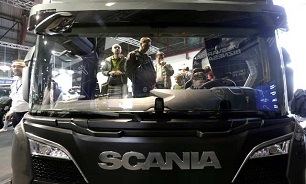Scania says U.S. sanctions put entire Iran truck sales in "jeopardy"
CEO Henrik Henriksson said Scania, which was one of the first truck companies to return to Iran after the EU lifted sanctions in early 2016, had cancelled all orders that it could not deliver by mid August as anything after would have been hit by the new sanctions.

Khodrocar - Scania's entire sales into Iran could be lost if the United States reinstates sanctions against the country, the Swedish truckmaker's head warned on Friday, a day after first-half results showed the company's Iranian order book was already being hit.
CEO Henrik Henriksson said Scania, which was one of the first truck companies to return to Iran after the EU lifted sanctions in early 2016, had cancelled all orders that it could not deliver by mid August as anything after would have been hit by the new sanctions.
"Looking at the information we have on hand today, of course if nothing is improving, then (our) whole volume will be in jeopardy," told Reuters.
Among truckmakers, Scania, which is owned by Volkswagen, has one of the larger presences in Iran, selling 5,000-6,000 trucks and buses annually, according to Henriksson. That represents about 5 percent of its global vehicle orders of 109,415 last year.
Such a move would be another blow to the Iranian car industry, which unlike the energy and banking sectors, had managed to sign contracts with top European firms after the lifting of sanctions in 2016, attracting sizable foreign investment.
French carmaker PSA Group began to suspend its joint venture activities in Iran in June and Germany's Daimler said it was closely monitoring any further developments and would then evaluate the potential impact on its business.
Despite the efforts of European governments to salvage the nuclear deal and provide guarantees to European firms to protect them against secondary U.S. sanctions, many of them are leaving Iran anyway to avoid any possible U.S. penalties.
America accounted for 13 percent of Scania's orders for trucks, buses and coaches in 2017.
Scania declined to comment on how much of an impact the decline in orders from Iran, considered as one of their growth markets, had had on first half results.
The company's factories in Latin America and Europe are used to produce vehicles for Tehran and it distributes trucks and buses through local partners, which also own Scania's production and extensive servicing network in Iran.
Henriksson said Scania was also pressing for faster payment as sanctions could potentially close financing networks by November.
"As it is right now, it's a wind down window of getting orders out that were in before a certain date and getting payments in as much as you can," he said.
However, Henriksson said Scania was working on a contingency plan so that it could continue to deliver spare parts needed to keep its trucks and buses on Iranian roads running, but that nothing was resolved yet.
CEO Henrik Henriksson said Scania, which was one of the first truck companies to return to Iran after the EU lifted sanctions in early 2016, had cancelled all orders that it could not deliver by mid August as anything after would have been hit by the new sanctions.
"Looking at the information we have on hand today, of course if nothing is improving, then (our) whole volume will be in jeopardy," told Reuters.
Among truckmakers, Scania, which is owned by Volkswagen, has one of the larger presences in Iran, selling 5,000-6,000 trucks and buses annually, according to Henriksson. That represents about 5 percent of its global vehicle orders of 109,415 last year.
Such a move would be another blow to the Iranian car industry, which unlike the energy and banking sectors, had managed to sign contracts with top European firms after the lifting of sanctions in 2016, attracting sizable foreign investment.
French carmaker PSA Group began to suspend its joint venture activities in Iran in June and Germany's Daimler said it was closely monitoring any further developments and would then evaluate the potential impact on its business.
Despite the efforts of European governments to salvage the nuclear deal and provide guarantees to European firms to protect them against secondary U.S. sanctions, many of them are leaving Iran anyway to avoid any possible U.S. penalties.
America accounted for 13 percent of Scania's orders for trucks, buses and coaches in 2017.
Scania declined to comment on how much of an impact the decline in orders from Iran, considered as one of their growth markets, had had on first half results.
The company's factories in Latin America and Europe are used to produce vehicles for Tehran and it distributes trucks and buses through local partners, which also own Scania's production and extensive servicing network in Iran.
Henriksson said Scania was also pressing for faster payment as sanctions could potentially close financing networks by November.
"As it is right now, it's a wind down window of getting orders out that were in before a certain date and getting payments in as much as you can," he said.
However, Henriksson said Scania was working on a contingency plan so that it could continue to deliver spare parts needed to keep its trucks and buses on Iranian roads running, but that nothing was resolved yet.
Latest News


